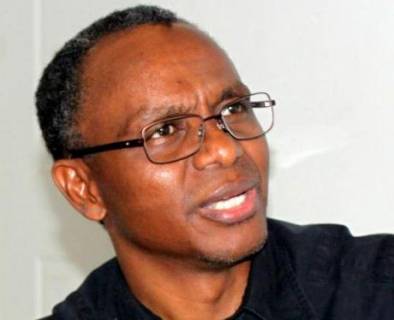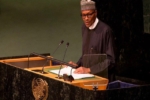Though elegant-sounding and seemingly mouthful, the word “subterfuge” actually connotes and denotes something far from noble – treachery.
It describes a bid to draw a red herring and, in the context of an argument, disrupt the opponent’s stream of consciousness by smuggling a diversionary matter into the loop.
One cannot find a better word to classify the war of pay slips that erupted in the past few days between Nasir El-Rufai, the feisty Kaduna governor, and the otherwise dour-faced House of Reps Speaker, Yakubu Dogara.
What began as a genial altercation between the duo at a public forum in Kaduna last weekend on the relativity of gluttony between the executive and legislative branches soon degenerated to the artillery of vouchers.
First to fire the bazooka on Monday was El-Rufai, who tendered not only his pay-slip indicating a net monthly salary of N470,521.74 but also how his N4.556b annual security vote is spent.
He was responding to Dogara’s charge that he make full disclosure on his own share of the security vote commonly perceived as a governor’s ultimate “pot of soup” (apologies to Tom Ikimi).
The Kaduna chief executive had challenged the Speaker to explain the colossal N115b the National Assembly cornered in the 2016 budget, for instance.
Goaded by what seems more of ego than a willingness to submit to public scrutiny, Dogara responded by unveiling his own pay-advice revealing a compensation package of N346,577.87, smaller than El-Rufai’s.
As a parting blow, he then not only accused the Kaduna governor of seeking to obfuscate the issue by publicizing security budget targets in the appropriation act instead of the actual disbursement of security vote, but also hit him below the belt by drawing attention to his perceived mishandling of the Southern Kaduna affair.
Taken together, the Dogara/El-Rufai tiff is a welcome development. But just as they look great on principle, both are wrong in details.
We shall return to the vexed issue of security vote presently.
While El-Rufai deserves commendation for, at least, offering to come clean on a subject most of his brother governors often consider grave secret, seeking to make an issue of the size of his monthly pay packet is self-defeating. It only averts the public mind again to the profanity in the sacrifice President Buhari and some governors earlier claimed they made by announcing own pay-cut.
Truth be told, wages and salaries are only a drop in the ocean of public expenditure. What bleeds the public treasury significantly hardly yields itself readily to the ordinary eyes of even the most forensic of auditors.
For instance, even by simple arithmetic, we will find that what PMB spares the nation monthly by the big salary cut he declared against himself in 2015 only amounts to chicken feed compared to what is spent each time he flies thousands of miles abroad to meet his doctors.
Then, the haunting irony: a forthright president who two years ago made a public show of his own pay-cut amounting to a few hundreds of thousand is now fiercely unwilling to, for instance, disclose the millions it cost Aso Rock having him go under the surgeon’s scalpel in London over 50 days.
To ensure more judicious use of taxpayers’ money, I think we should resist being seduced with the tokenism of salary cut. Rather, what should be secured is the commitment of the state executives against waste and other manifestations of prodigality.
For instance, is the next scheduled international jamboree to woo “foreign investors” really necessary? Agreed “the old boys/girls” network deserves to be serviced. But couldn’t they be challenged to think up more rigorous schemes that create more value than the now jaded option of furnishing a proposal on seminars and workshops for the workforce?
Just how many of such do the civil servants really need to perform?
As for Dogara, I think he misses the point by assuming he could dodge accountability by merely tendering old pay-slips which integrity is, by the way, already questioned by a House rebel, Abdulmumin Jibrin.
Responding to the Speaker’s claim of only getting N346k monthly, the suspended Rep, who blew the whistle on the nefarious practice of budget padding last year, said the salary he, an underling, was receiving is fatter than Dogara’s.
There could then be only three probabilities: either the accountant overpaid him or he is lying or – most abominable of all – the Speaker himself is telling a big lie.
Indeed, since monetary transfer became a first-line charge in 2010, allegations of self-aggrandizement have constantly trailed the National Assembly. Rather than flaunting a cheap pay-slip, the least we expect of Dogara is dispel as false, with hard facts and precise figures, the nagging reports that federal lawmakers quietly pocket tens of millions monthly or quarterly under the guise of such opaque headings like aides’ wages and constituency allowances.
If Dogara’s miserable N346k pay-slip is to be believed, the puzzle then is by what abracadabra would the remaining over N100b be cleaned out from National Assembly’s treasury within twelve months? It must be by some bazaar obviously beyond the earshot and eye-view of the rest of us.
But the real skeletons are in Dogara’s makeshift cupboard. How relevant are the incessant foreign trips federal lawmakers embark on at taxpayers’ expense to their legislative duties? To say nothing about the other slimy charge that the so-called “public hearings” mounted by committees are often parlayed to extort hapless officials of public agencies put on the spot.
Perhaps the most incongruous, if not starkly illiterate, of all is Dogara’s new self-assigned advocacy for local councils. It is a betrayal of a warped understanding of federalism to assume the present structure is sustainable in the first place.
While it is true that many governors see allocations meant for the third tier of government as part of their own slush fund, the way to help the victims is not continuing to lament the situation.
The mess that councils largely constitutes across the nation today is partly due to poor constitutional footing. The same federal constitution that seeks to confer financial autonomy on that tier also subordinates it solely to state authorities. Only the state assembly is empowered to oversee the councils while the governor reserves the right to sack the head.
By now, it should be clear to Dogara that the present constitutional architecture is a perfect recipe for under-development. In any case, the proliferation of councils during successive military regimes rule was mostly informed by political racketeering than any thought for social justice.
It explains today’s paradox of Lagos and Kano States. By 1967, both had 20 councils each. Thirty years later, whereas Lagos remained intact with the same number of councils, another state – Jigawa – had been created out of the old Kano. So, whereas Lagos retains the original 20 councils till date, Kano and Jigawa now boast a phenomenal 71 councils (44 and 27 respectively). And the number of councils you have determines the size of your share from the national cake!
So, it is clear that the real consideration for the creation of council was far from the often advertised need to “bring development” closer to the grassroots; it’s actually formatted to be a sharing center for elite larceny.
To end this perennial fraud once and all, the historic duty before Dogara and co is to steer the nation back to the path of common sense.
Federalism presupposes that states are the units. Let the states be allowed to determine their number of councils to reflect their real needs and true aspirations.
Of all Dogara expects of El-Rufai, the most potentially “treasonable” would, of course, be a full disclosure on the security vote. It will be most unfair to argue that only the governors “chop” alone here. While the excesses of some state chief executives are inexcusable, the truth is that various security agencies actually draw from this “slush fund”.
Starved – or practically abandoned sometimes – by Abuja, heads of such security outfits daily bombard the governors with material requests ranging from operational to personal.
Those seeking to curb the abuse of what is then left of the security vote would do well by tying such quest to a re-orientation of the larger society as well. Truth be told, we also make excessive demand on public officers without bothering how they get the money, thus playing the biblical Pharisee.
For instance, when various committees of both senate and House of Reps make it a habit to constantly besiege state capitals on “oversight functions” and pay the usual “courtesy calls” on governors, how many of them will not expect, as of right, a “Ghana Must Go” bag on their way out?
And when reporters travel to a state and seek the “official side” to balance his/her “in-depth report”, how many can resist the temptation of an envelope at the exit door?
Of course, the appropriation bill signed into law does not expressly make provisions for such “stomach infrastructure”.
Today, what El-Rufai and other governors would perhaps also be too shy to make public on the security vote is the fraction that goes out to propitiate constant “pressures” from other “stakeholders”.
Of course, these include party leaders whose children are wedding. Or the local party subaltern whose wife just put to bed. “Community leaders” seeking lifeline to travel abroad for life-threatening medical procedures. Or General Overseers of churches or Imams of mosques who are going to host special crusades to “pray for the peace and stability” of the state.
From my own experience, these are some of the informal “cost centers” the security vote is applied to service.
Sahara Reporters
This page has been viewed 364 times
Tags : Editors choice






























